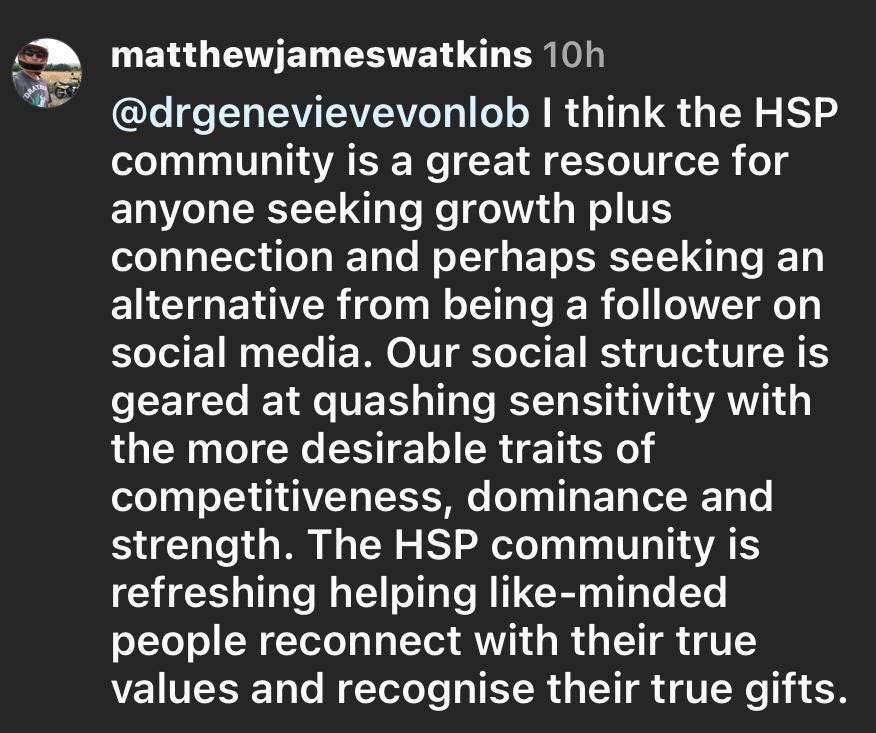Understanding the Highly Sensitive Child
Validating their big feelings makes all the difference.
I’m delighted to be teaming up with coach and trainer Jules De Vitto to run a Highly Sensitive Person retreat at the gorgeous Quadrangle in Kent, UK, on June 15-18, 2023. Jules and I have worked very hard to make this a great value offering with fantastic food and accommodation — and opportunities to take part in carefully-curated activities — from workshops on high sensitivity, breath work and wild swimming, to ecstatic dance, sound baths and more. All activities are optional and you’ll have plenty of time to relax in nature. Early bird bookings are open until March 31. We’d love to see you there!
Meanwhile, I warmly invite you to join The HSP Revolution online membership community — where I host two live workshops per month, post daily inspiration, and provide opportunities to share and connect. We’ve just had a great workshop on “Managing Our Energy As HSPs.” I’ll be holding the next workshop on “Living Our Purpose,” on Thursday 9 March at midday GMT. Here’s what members are saying:
Access to this weekly newsletter is now reserved primarily for community members. I will continue to send one edition per month free to all existing subscribers. To continue reading the whole newsletter each week, please do join us in the membership community, and gain access to workshops, daily inspiration and more!
I first learned about high sensitivity while working as a clinical psychologist in Child and Adolescent Mental Health Services in east London a decade ago.
I was coming across so many young people who seemed to be such deep feelers, that I began reading everything I could to try to figure out whether I was seeing some kind of pattern. That’s how I came upon Dr Elaine Aron’s work on the 30 percent of the population who are considered Highly Sensitive People (HSPs). My understanding of the children I was working with — and myself — radically changed.
Although I love working with Highly Sensitive Children, I love working with parents, grandparents, teachers, therapists and social workers who support these children just as much. So I was delighted to run a workshop yesterday for participants on a three-month professional training in empowering Highly Sensitive Children, run by my friend Jules De Vitto.
There is no way that one newsletter could begin to do the topic of supporting Highly Sensitive Children justice — but I thought I’d summarise some of the key points that came through during last night’s workshop. (And parenting Highly Sensitive Children will of course be a topic I’ll be exploring in my new The HSP Revolution online community).
Always holding labels lightly, I’d like to start by emphasising how much diversity exists among Highly Sensitive Children. Just like HSP adults, sensitive children can be intraverts, extroverts, and High Sensation Seekers. They can also vary widely in how deeply they process sensory input, thoughts, and emotions, and how sensitive they are to their environment. There can never be a one-size-fits-all approach for connecting with a Highly Sensitive Child.
That said, I do think there are some key things to bear in mind — whether you are parenting a sensitive child, or working with them in a professional capacity — and I thought I’d share some of the key points I made last night.
Big Feelings
Because Highly Sensitive Children process thoughts and feelings so deeply, they can easily feel overwhelmed — leading to intense meltdowns that can be very challenging to manage. With their attention to subtle detail and perfectionism, they can be absolutely devastated by something as seemingly trivial as you cooking them a different brand of Baked Beans, or them discovering the tiniest rip in the artwork they’ve just created. If they feel you’ve favoured a sibling in an argument, they can experience intense feelings of anger at the perceived injustice. The intensity of their reactions can seem so disproportionate that it can be confusing for adults to witness. These reactions are also confusing for the child — who will often feel almost entirely powerless in the face of their big feelings.
It’s at moments like these that we have to make the extra effort to remember that we can build a relationship with a Highly Sensitive Child only to the extent that we are prepared to unconditionally accept them for who they are. If we can show them that they are loved and valued — no matter how intense their reactions may be — we will be helping them establish a core belief that their feelings, well-being and experience matter. It’s absolutely crucial that we attempt to see the world through their eyes — even if we may never quite understand why it is that they react so intensely to situations that other children seem to handle much more easily.
Seen And Heard
The best thing we can do is to make sure that a Highly Sensitive Child feels fully seen and heard by us — no matter how messy their feelings are in the moment. Traditional disciplinarian parenting strategies used in the past simply don’t work with these children — they see right through them. Highly Sensitive Children don’t play along with cookie cutter parenting techniques: They respond to warmth, connection and attachment — even though nurturing these qualities can be challenging when feelings are running high.
What I’ve observed many times in my own work with Highly Sensitive Children is that — far more than other children — they demand to be treated as equals. Many sensitive children have an extraordinary degree of wisdom and maturity about them — which can foster a beautiful capacity for intimacy, but also lead to rebelliousness and defiance. Of course, we still need to hold boundaries to keep these children safe. But we have to cast ourselves in the role of benevolent leaders who can come alongside the Highly Sensitive Child, see them for who they are, and provide a rationale for why they should cooperate with us. Once they can sense we understand and respect them, they will be much more receptive to what we have to say.
All children need quality connection time with adults. So many times, parents have said to me: “But I spend loads of time with the kids!” On closer exploration, it may be that a lot of this time is actually invested in task-oriented activities such as making dinner or going to the supermarket. But children — and especially Highly Sensitive Children — need to connect through fun and play, and feel like you’re filling up their “attachment tank.” These children can become so overstimulated by the pressures of school homework and friendships, that they need to plug in to adults to co-regulate their finely-tuned nervous systems — and find their safe place.
Heart Connection
It really helps to be aware of your own energy whenever you’re approaching a Highly Sensitive Child — especially if their emotional bucket is full after a long day. Imagine you were in a field trying to connect with a skittish horse: You have to embody congruence — where your inner state and your outer actions, words and demeanour all align. Highly Sensitive Children can sense your energy — so the more you can maintain your own inner balance, the easier it will be connect. Check in with yourself: How is your posture, facial expression, tone of voice? The Highly Sensitive Child will pick up on all of these cues — so try to make sure you are embodying warmth, reassurance and acceptance — and they will respond.
Above all, validate the Highly Sensitive Child’s experience. You don’t have to agree with them on everything — but you do need to make the effort to understand where they are coming from, and enter into their world to understand why they are so upset about something — however trivial it may seem. If you’re saying the right words, but you haven’t established a genuine connection, the child won’t respond: Highly Sensitive Children hate nothing more than scripted phrases. You have to meet them where they are in the moment, and speak from the heart.
It can be very demanding to parent or work with a Highly Sensitive Child — and I’m speaking now as the mother of a five-year-old HSP, as well as from my clinical experience as a psychologist. But if we can make that extra effort to connect, validate and offer unconditional acceptance — we can help a child establish a foundation of self-worth that will nourish them for the rest of their lives.
See you next week!





